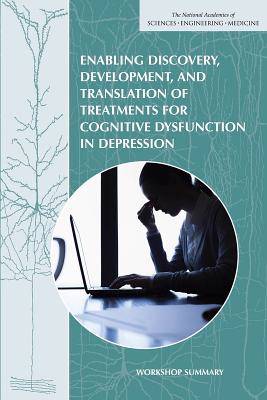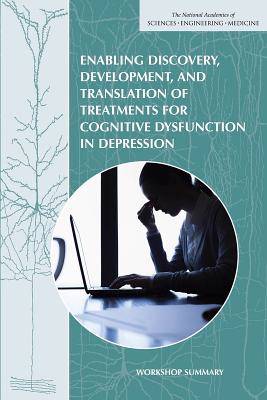
- Retrait gratuit dans votre magasin Club
- 7.000.000 titres dans notre catalogue
- Payer en toute sécurité
- Toujours un magasin près de chez vous
- Retrait gratuit dans votre magasin Club
- 7.000.0000 titres dans notre catalogue
- Payer en toute sécurité
- Toujours un magasin près de chez vous
Enabling Discovery, Development, and Translation of Treatments for Cognitive Dysfunction in Depression
Workshop Summary
National Academies of Sciences Engineering and Medicine, Institute of Medicine, Board on Health Sciences Policy, Forum on Neuroscience and Nervous System DisordersDescription
Major depressive disorder (MDD) is recognized worldwide as a major cause of disability, morbidity, and mortality. According to the World Health Organization, unipolar depressive disorders affect more than 150 million people around the world and represent the leading cause of years lost due to disability among both men and women. In the United States alone, nearly 8 percent of persons over the age of 12 report current depression. MDD has long been defined primarily as a mood disorder. However, more recently people have begun to recognize effects on cognition as a major contributor to the disablement that accompanies depression and to consider this an underrecognized treatment target for depression.
To explore how best to enable the discovery, development, and translation of treatments for cognitive dysfunction in depression, including a focus on the regulatory path forward, the Institute of Medicine's Forum on Neuroscience and Nervous Disorders convened key stakeholders at a workshop in February 2015. This report summarizes the presentations from expert speakers and discussions among workshop participants.
Spécifications
Parties prenantes
- Auteur(s) :
- Editeur:
Contenu
- Nombre de pages :
- 90
- Langue:
- Anglais
Caractéristiques
- EAN:
- 9780309373937
- Date de parution :
- 29-11-15
- Format:
- Livre broché
- Format numérique:
- Trade paperback (VS)
- Dimensions :
- 152 mm x 224 mm
- Poids :
- 158 g

Les avis
Nous publions uniquement les avis qui respectent les conditions requises. Consultez nos conditions pour les avis.






